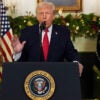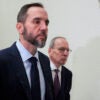
In the three months since President Barack Obama released his first National Security Strategy (NSS), the news has been dominated by his responses to domestic problems—from the economy to the Gulf oil spill to more stimulus spending. And that focus on traditionally domestic issues is reflected in the 2010 National Security Strategy.
At 34,314 words, the document is nearly twice as long as Bush’s 2006 edition (19,731 words) and nearly three times as long as Bush’s 2002 edition (12,745 words). The 2010 NSS is notable in that it dramatically changes the focus and priorities of the U.S. government regarding national security policy. The proof is in the numbers.
Winners:
- Climate change. One of the most noticeable differences in Obama’s national security strategy as compared with his predecessor’s is that it elevates climate change as a national security priority over even the threat of armed foreign aggression. Obama states, “The danger from climate change is real, urgent, and severe.” No such urgent warning appears in the text addressing terrorism, proliferation, or more traditional state-based threats. In fact, the word “severe” is only used one other time—to describe the harmful effects of corruption on international development. The word “climate” appears 28 times in the 2010 NSS, compared with Bush’s use of the word only once in 2006. In fact, “climate” appears more frequently than “Al-Qai’da” or the combined variations of “proliferation” in the 2010 NSS.
- Environment, energy, and health. There are practical reasons for the U.S. to be concerned that natural resources are being used to advance freedom and prosperity around the world. America uses its resources not just for the benefit of its citizens, but to fight pandemic disease and entrenched poverty, to pursue cleaner energy strategies that do not jeopardize economies, and to aid recovery after natural disasters around the world. President Bush mentioned environmental and energy issues in his NSS, but President Obama goes further. He uses the term “clean energy” 11 times compared with Bush’s single reference; “disaster” 13 times compared with five instances in Bush’s NSS; and “disease” 20 times compared with Bush’s eight. Obama does not tie these concepts directly to a national security threat. For example, he describes clean energy development as a cornerstone of American leadership in the world, chief in the global campaign against climate change, and a potential source of great economic gain, but not as part of a more urgent effort to reduce the ability of strategic enemies—like Iran—to use their energy resources to exert influence over U.S. policy.
- Women and girls. The 2010 NSS commits the United States to the prevention of violence against women and girls, increasing their access to justice and political participation, and combating human trafficking and other international crimes that too often exploit women—objectives long advanced by previous Administrations as well. However, the terms “women” or “girls” appear a total of 22 times in Obama’s NSS, compared with four in 2006. And where Bush appealed to natural law in affirming women’s “inherent dignity and worth,” Obama says only that women “should” have opportunities equal to men’s and that “countries are more peaceful and prosperous” when they do. Whereas Bush considered the fight for women’s rights a benchmark in the advance of freedom, Obama merely says that countries that respect women’s rights are relatively “more just, peaceful, and legitimate.”
Losers:
- The War on Terror. The 2010 National Security Strategy fixes far less attention on combating transnational terrorism than did Bush’s 2006 NSS, which referred to “terrorism,” “terrorist(s),” or “counterterrorism” 100 times. Despite its far greater length, the 2010 NSS mentions these terms only 55 times. Obama’s NSS never uses the term “global war on terror,” instead calling our efforts a “global campaign against al-Qa’ida and its terrorist affiliates.” Thus, for Obama, the U.S. is not at war; instead, it is in a campaign. We are no longer fighting terrorists; instead, we are targeting affiliates of just one terrorist group.
- The effort to deny terrorists weapons of mass destruction. Bush’s 2006 NSS used the terms “weapons of mass destruction” or “WMD” 38 times, while Obama’s 2010 NSS uses them just six times. Language that in the Bush 2006 document explained the danger of the nexus of terrorism and WMD does not appear; instead, there is language about the “crime-terror nexus.”
- Freedom and democracy. The Bush Doctrine made democracy promotion a pillar of U.S. security strategy. President Bush frequently argued that the “non-negotiable demands of human dignity” require the advance of justice everywhere and that such progress in strategically important locations is central to vital U.S. interests. The 2006 NSS reflected this belief, using variations of the terms “democracy” or “democratic” 124 times. Obama’s 2010 document, by comparison, uses these words 55 times. Bush mentioned “freedom” 80 times in 2006, while Obama’s document mentions this core American value just 11 times. Further, Obama speaks only once about confronting “tyranny,” in sharp contrast to Bush’s 18 references to “the ultimate goal of ending tyranny in our world.”
Changing Course
Taken together, such evidence indicates a stark change in America’s national security goals by President Obama. In fact, after correcting for the difference in length of the 2006 and 2010 National Security Strategies, the starkness of his changes grows. Obama refers to the issue of terrorism 68 percent less often than Bush did. He has slashed references to weapons of mass destruction by 91 percent. He speaks of democracy 74 percent less often than Bush did, and freedom 92 percent fewer times.
A Better National Security Strategy
The desire to promote the liberties and freedoms we enjoy in order to build an “empire of liberty” that sustains peace around the world has been a priority of U.S. Presidents since the nation’s infancy. The idea of a Pax Americana is part of our national conscience; Americans understand that peace depends upon the vitality of our power and influence. President Obama’s national security policy undervalues America’s security interests and misstates core security principles. Instead, America’s leaders should:
- Prosecute the War on Terror, not just individual terrorists. The most immediate threat to U.S. security continues to be the nexus of transnational terrorism and weapons of mass destruction. Secretary of State Hillary Clinton has noted this, saying this danger is “the biggest nightmare that any of us have.” The U.S. cannot afford to revert to Clinton-era policies of trying to marginalize terrorist acts as civilian crimes. Transnational terrorism is a barbaric act of war and it must be prevented at any cost. President Obama should bring to bear the full resources of our nation and the free world to end this scourge against humanity.
- Wield U.S. power in pursuit of justice. Leadership is not properly measured by poll numbers and popularity. The world is not necessarily freer in the absence of tension. The world has been made freer each time the U.S. rolled back forces that impeded the expansion of freedom. We should seize every opportunity to protect and expand an international “empire of liberty.”
- Continue to base national security priorities and tactics on our nation’s strengths. America draws its greatest strength from its citizens, who historically have recognized threats to liberty in the world, and have been prepared to defend it. They are the reason we have become the greatest military and economic power the world has ever seen. Our nation’s leaders should seek to sharpen every instrument of U.S. power—military, economic, and diplomatic—to preserve our liberties and expand the “empire of liberty” around the world.
America became the sole superpower in the latter part of the 20th Century by adhering to its core principles. It would be perilous in the 21st Century to assume that we can abandon these principles or subordinate them to popular global interests. Protecting our national interests and assuring our security is the federal government’s first and foremost constitutional duty.
Nick Krueger is the Jordan Saunders Intern in the Young Leaders Program at the Heritage Foundation. For more information on interning at Heritage, please visit: http://www.heritage.org/about/departments/ylp.cfm.
































One Reply to “The 2010 National Security Strategy, By the Numbers”